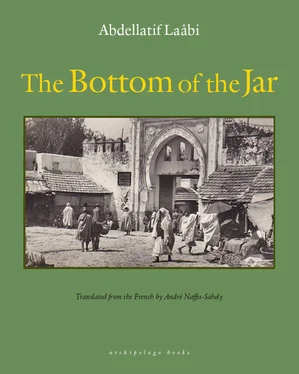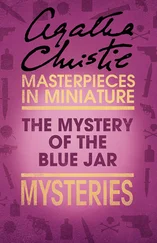The fellow would take the teasing in stride and with good humor, seeming to accept it as an homage to his virility. He knew that the joke would be on someone else the following day. That was how the working day started off in high spirits.
Namouss didn’t understand any of this secret language when he first started frequenting the souk. He didn’t get why paying a visit to the hammam and having a passion for cleanliness should be so embarrassing. He didn’t know the difference between major and minor ablutions, 6that is until Si Daoudi, the Arabic teacher, shed some light on the matter. The lesson broached the subject of prayers and the ritual purification they required. Minor ablutions would suffice in this case, unless the worshipper in question invalidated them by urinating or breaking wind immediately preceding the hour of prayer. Major ablutions were only necessary in cases of “extreme filthiness.” The dutiful Muslim would then have to go to the hammam to cleanse himself. The teacher had limited himself to these cryptic stock phrases, but when confronted by a bold student’s insistence that he elaborate, he explained further that this “filthiness” occurred when a man got together with a woman.
“One shouldn’t be ashamed when it comes to religious matters. You bunch of philistines should keep in mind that without this sort of lawful intercourse, none of you would have come into this world.”
Ever since, while Namouss didn’t know all the ins and outs of these lewd innuendos, he at least could gather what they were about, and above all dreaded the day when it would be Driss’s turn to become the butt of everyone’s jokes.
Namouss would only go to the souk in the morning on rare occasions. That would only happen if Ghita sent him on an errand, or when he finally consented — and only after putting up a struggle — to having his hair cut, leaving his precious locks behind in Doukkali’s shop. Namouss had a bone to pick with Doukkali. The memory of his circumcision was still fresh in his mind. Not that he resented the operation. He had, after all, longed to be like all the other children. In the months leading up to the operation, the friends of his who had already been through the procedure began teasing him about the end of his willy that hung down a bit too far. What he rebuked Doukkali for was his underhanded ways. When Namouss had finally decided to put a brave face to the operation, the barber had resorted to subterfuge.
“Look at the little green bird chirping away up there!” he’d said.
As soon as Namouss had lifted his gaze to look for the bird with the rare color, Doukkali swooped down with his scissors.
Namouss also resented him for more mundane reasons. Namouss almost had a heart attack each time Doukkali cut his hair. Using stubborn tufts of hair as an excuse, he wouldn’t stop shearing until Namouss was almost bald. Namouss didn’t dare utter an objection, and the moment he got out of there, he was mortified to catch sight of himself, having been shorn like a sheep. He also couldn’t stand the noxious smell emanating from the barber’s hands, the man clearly never washed his hands after going to the bathroom. It was tough going. Namouss had to hold his breath to the point of near suffocation. It was a real relief when the barber sprinkled talcum powder on his head and around his ears, before giving him a once-over with a soft brush and standing back to admire his handiwork.
“Look at you, you look just like a newlywed!”
But bad memories of the Sekkatine were few and far between. The afternoons, for example, were splendid. Namouss used to love hoisting himself into his father’s shop just before rush hour and resting his elbows on the workbench to watch him work. From these moments, Namouss’s olfactory memory stored a variety of smells: goatskin, calfskin, hemp yarn, wax, natural or colored wool, bits and stirrup irons, wood, some flour-based adhesive, and of course snuff, which Driss, like the majority of people in the Sekkatine, consumed vast quantities of. His father’s smell was a subtle mix of all these odors. What fascinated him most, however, were Driss’s hands, which were large for a man his size and so agile that they seemed to act independently of his body. He wore leather thimbles on his thumb and middle finger, making them appear unusually long in comparison to the others. The callused hand he slammed down on the saddle to reinforce the seams was as strong as a hammer. Namouss admired these displays of Driss’s energy and ingenuity. He knew those hands were blessed, that they both fed and protected him.
When customers showed up, Namouss took a similar pleasure in following the minutiae of negotiations. Driss would begin by displaying the different types of saddles and explaining their specific uses. If the customer was a fantasia rider, Driss would show him the appropriate ceremonial saddle. The customer would then choose between the Fez style, with gold embroidery, or the Tlemcen style, with silver embroidery. If the saddle was meant for everyday use, then standard thread would suffice. The saddle would subsequently be fitted with a tarchih , composed of several layers of wool carpets sewn together, which would be placed directly on top of the horse’s back, before being equipped with a harness, a pommel, a cantle, a crupper, a throatlatch, and reins. They finally came to the most delicate part of the negotiations: money. The customer would then transform into a humble beggar, swearing up and down that the harvest had been bad that year and that he was on the brink of utter ruin. He beseeched Driss to take pity on his children and help him through this difficult patch.
“Let me kiss your hands, maâllem , don’t be so hard on me.”
This farce didn’t fool Driss, who’d seen some performances in his time. But the man’s speech seemed to have moved him, and he proposed, “All right, do you know what we’re going to do? We’ll leave the haggling to one side and concentrate on the profit margin. The base cost of what it is. Now what are you going to give me for my troubles?”
“A thousand, maâllem .”
“May Satan be cursed, my good man. Do you know how much work this is going to take?”
“Open your hand, maâllem , this is what I will give you: fifteen hundred and not a penny more. Were I to add even a penny more, my wife would throw me out.”
“Leave your wife out of this, my good man. Give me your money and take your saddle. Thanks be to God, oh He who looks after our needs and deals us our lot in life.”
On that note, Driss held out his hand and the customer pulled out a wad of bills and counted them: “One for God. Two” — and here he didn’t add a qualifier — “Three. .”
Namouss stared wide-eyed at the scene before him, rejoicing as each bill went into his father’s hand. Come the following Friday, he thought to himself, I will be able to ask him for a hefty tatriba (allowance).
THE SEKKATINE GREW more and more animated. The public auction had begun. The first items under the hammer were lbadis (small woolen carpets) handmade by the maâllmate , who entrusted their wares to hawkers like Ammour or Raïss, who went — carpets under their arms — from shop to shop to collect orders. The artisans paid close attention to the labels on each carpet; those made by Chérifa, the Berber woman Fdila, or Merqtani’s daughters were prized above all the others. They had even come up with a secret code to indicate the quality of the wares. Namouss eventually managed to decipher it, too. He knew that those marked chorba were of a poor quality while the opposite was true for those marked jrih .
After the woolen carpets, the secondhand saddles, stirrups, and moukhala guns made the rounds. It got to the point that items completely unrelated to saddlery were peddled: samovars, copperware, engraved daggers. . But eventually business slowed down and the souk would recover a little tranquillity. The shopkeepers did their paperwork and the craftsmen went back to work, albeit less energetically than before. The local café was flooded with orders, people asking Krimou, the owner, for coffees or mint teas, which were served in chebri glasses. Out came the nuts or the snuffboxes and everyone gave themselves over to pleasure. This was also the time when passing visitors were welcomed and gossip was exchanged: weddings, divorces, deaths, houses that had gone on the market, inflation, new products, and — naturally — the arm wrestling between nationalists and the colonial authorities. People made hushed references to Allal al-Fassi, Belhassan Ouazzani, 7Abdel el-Krim Khattabi, 8the sultan (may God grant him victory), and the corrupt caids who blighted the countryside. They weighed up the relative strengths of the Americans and the Russians (the two leading powers) and their support for Egypt, and prayed to God to take pity on Muslims as a whole and deliver them from evil.
Читать дальше












